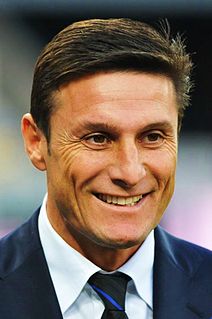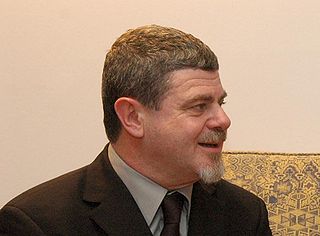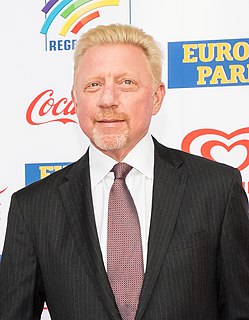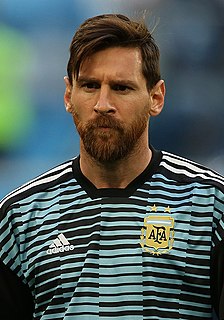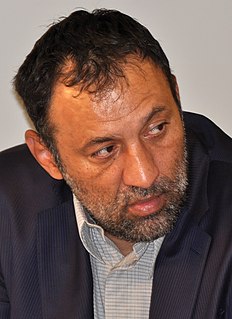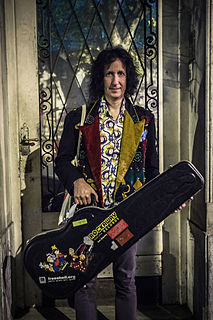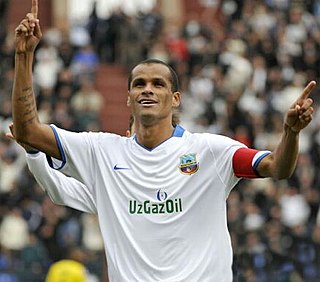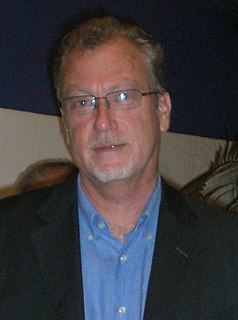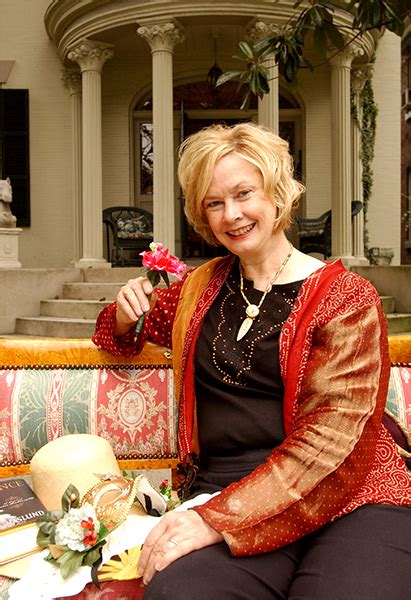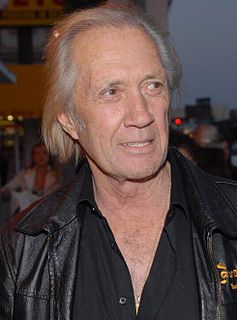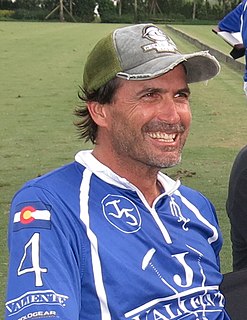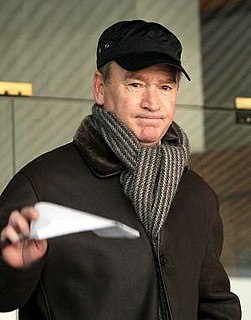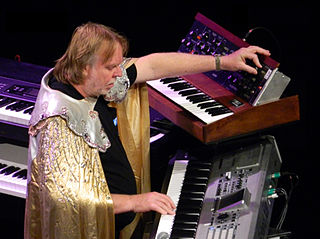Top 282 Argentina Quotes & Sayings - Page 5
Explore popular Argentina quotes.
Last updated on November 22, 2024.
The pope [Francis] takes his vocabulary from his pastoral experience, not from the rhetorical tool kit of liberation theology, with its Marxist yammering about "center" and "periphery." The "peripheries," for Francis, are all those who have fallen through the cracks of late-modernity and post-modernity - in his native Argentina, because of colossal corruption, political and financial.
We have inhabited both the actual and the imaginary realms for a long time. But we don't live in either place the way our parents or ancestors did. Enchantment alters with age, and with the age. We know a dozen Arthurs now, all of them true. The Shire changed irrevocably even in Bilbo's lifetime. Don Quixote went riding out to Argentina and met Jorge Luis Borges there. Plus c'est la même chose, plus ça change.
I think the most surreal moment for me having been a kid who was on unemployment, was on food stamps - I'm not kidding you, to utter these words aloud is so surreal to me - but to say, "I had to give up my Super Bowl tickets for my all-expense paid research trip to Argentina's wine country," it was like, who's life is this? It was splendid, and the nice thing was that they renewed my contract for another year.
I grew up in a humble neighbourhood in Argentina called Dock Sud. From my house, about 200 metres away was a football pitch. That's where I spent my childhood. It's a neighbourhood where everybody helped each other because there was a lot of difficulties. There, I grew up happily, because I learned a lot of things.
What beefsteak is to Argentina, flamenco to Spain, cool reserve and self-control in all situations to an Englishman, what vodka is to a Russian and beer to a Bavarian, what money is to a Swiss, that is outdoor-life to an Australian. It is a noble mania, better than vodka, better than cool reserve, better than money.
A horse perceives eye contact as provocative, as if it and its status in the herd are not being respected. If it cannot avoid eye contact, it will react in a different way, by rebelling for example. In dressage you don't get anywhere by not showing respect, however superior your species might be. Any animal trainer can tell you that. In the mountains in Argentina there's a wild horse which will jump off the nearest precipice if any human tries to ride it.
To be asked to do the pairing menus by Alamos Wineries in Argentina [was the most interesting opportunity]. There are so many chefs out there, and so if you were to say, "The dude who used to host Man V. Food is doing pairing for Jim Beam," you'd say, "Okay, that's kind of conceivable." If you're talking about the dude from Man V. Food is doing pairings for fine wine, then I think people might not necessarily anticipate that.
Taking on all at once Germany, Japan, and Italy - diverse enemies all - did not require the weeding out of all the fascists and their supporters in Mexico, Argentina, Eastern Europe, and the Arab world. Instead, those in jackboots and armbands worldwide quietly stowed all their emblems away as organized fascism died on the vine once the roots were torn out in Berlin, Rome, and Tokyo. So too will the terrorists, once their sanctuaries and capital shrivel up - as is happening as we speak.
Actually, my first group was a folkloric group, an Argentine folkloric group when I was 10. By the time I was 11 or 12 I started writing songs in English. And then after a while of writing these songs in English it came to me that there was no reason for me to sing in English because I lived in Argentina and also there was something important [about Spanish], so I started writing in Spanish.
The first lady of Uganda is a devoted evangelical and beloved by the faith community. At an evangelical conference in Argentina, one minister said, "Mama Janet has given us the keys to Africa." She has done that by creating a nation that has embraced a Dominionist form of Christianity that believes that Christians have a God-given right to rule the world.
So long as they (the Proles) continued to work and breed, their other activities were without importance. Left to themselves, like cattle turned loose upon the plains of Argentina, they had reverted to a style of life that appeared to be natural to them, a sort of ancestral pattern...Heavy physical work, the care of home and children, petty quarrels with neighbors, films, football, beer and above all, gambling filled up the horizon of their minds. To keep them in control was not difficult.
It's not that difficult to play well and win titles in a team like Barcelona, but it's in the national side where you see a player's true class. That was the case with figures like Pele, Diego Maradona and Zinedine Zidane. With Spain, Iniesta has shown that he is among the best players of all time and that's why I rate him higher than Messi or Ronaldo. Even though the latter two have incredible scoring records for their clubs, they still haven't won anything with Argentina or Portugal respectively.
Between 1831 and 1891, US armed forces - usually the Marines - invaded Mexico, Cuba, the Dominican Republic, Puerto Rico, Panama, Colombia, Nicaragua, Uruguay, Brazil, Haiti, Argentina, and Chile a total of thirty-one times, a fact not many of us are informed about in school. The Marines intermittently occupied Nicaragua form 1909 to 1933, Mexico from 1914 to 1919, and Panama from 1903 to 1914. To 'restore order' the Marines occupied Haiti from 1915 to 1934, killing over two thousand Haitians who resisted 'pacification.'
Argentina has elected a centre-right president, Mauricio Macri. Bolivia's Evo Morales, having lost a referendum that would have allowed him a fourth presidential term, spends his time muttering about CIA plots and issuing threats to jail journalists who persist in reporting influence-peddling scandals. The economy is a sputtering shambles.
I've lived in a preindustrial (rural Argentina) as well as an industrial world. You experience a different sense of time in a community that works the land. Human relationships aren't professionalized or contractualized; family and friends take primacy. Life has much more continuity than discontinuity. There's a great deal of poetry in everyday life.
People talk about how many goals I score, how I play, how I move on the field. In Argentina, on the other hand, they're always digging for dirt, and they continue to talk about me as the husband of Wanda Nara, that guy who stole the woman and ruined the life of a former teammate, when it was never actually like that.
It is very difficult to enter a single currency zone having fairly weak economic parameters and maintain a favourable state of the economy, not to mention positive growth rates. We have witnessed it not only in Europe, but for example in Argentina (nearly 10 years ago or more), when they tied the national currency to the dollar and later they did not know what to do about it.
I took a dozen of our top managers to Argentina, to the windswept mountains of the real Patagonia, for a walkabout. In the course of roaming around those wild lands, we asked ourselves why we were in business and what kind of business we wanted Patagonia to be. A billion-dollar company? Okay, but not if it meant we had to make products we couldn't be proud of. And we discussed what we could do to help stem the environmental harm we caused as a company. We talked about the values we had in common, and the shared culture that had brought everyone to Patagonia, Inc., and not another company.
Argentina is a very interesting culture because unlike Europe and the US, they did not abandon rock and roll music, they did not turn their backs on it. It's an important part of their culture. So guitar music is an important part of their culture. So me being into rock music, I get respect working there, which wasn't happening in Europe or in the US.
I always thought I wanted to play professionally, and I always knew that to do that I'd have to make a lot of sacrifices. I made sacrifices by leaving Argentina, leaving my family to start a new life. I changed my friends, my people. Everything. But everything I did, I did for football, to achieve my dream.
Some places, because of their spiritual history, are noted to be locations where people will often experience an open heaven. In fact, there are places where the heavens are open more than in other places. Most of you are familiar with previous moves of God in places such as Toronto (The Toronto Blessing), the meetings in Pensacola, and Argentina, just to name a few. Just like in Jacob's day, today, there are certain places where heaven is open, geographical locations where you are more likely to have an encounter with God.
I spent ten years in London; I trained there. But because I started in English, it kind of feels the most natural to me, to act in English, which is a strange thing. My language is Spanish; I grew up in Argentina. I speak to my family in Spanish, but if you were to ask me what language I connect with, it'd be English in some weird way.
Of course each citizen should try to educate him or herself, but only after receiving some essential, basic blocks of knowledge. Formal education should always be free; from kindergarten to PhD. It is free in many European countries, and in several Latin American ones (including Cuba, Mexico and Argentina). China is returning to free education, as it is returning to universal health care. In countries like Chile, people are on the streets right now fighting for free education, and they are winning!
Charles Darwin, who had witnessed the
atrocities perpetrated against Argentina’s native
Indians by Juan Manuel de Rosas, had predicted
that “the country will be in the hands of white
Gaucho savages instead of copper-coloured Indians.
The former being a little superior in education,
as they are inferior in every moral virtue.
Darkroom: A Memoir in Black and White is remarkable for its truth-telling about two important issues concerning Alabama's past and present: the civil rights movement and immigration. These stories, rendered through the words and eyes of a young Latina girl who came from Argentina to Marion, Alabama, are made vivid and immediate through Weaver's highly accessible drawings and dialogue. This is a book-about maturation, family, education, and social change-every schoolchild, parent, and citizen should experience.
I think that even though The German Doctor (Wakolda) is placed in a historical context , it is a very intimate story. The film has been extremely well received around the world. It keeps on going around, opening in different markets, and connecting with the audience. In Argentina it was seen by over 450, 000 spectators, which is way more than anything we could have imagined.
When I was 11, I moved to the United States with my two brothers and my mom. We moved to northern New York, up near the Canadian border, from Argentina, and there was nobody there that spoke Spanish, and because there was no internet at the time, not even cable TV yet, I lost the connection with my childhood friends and the culture I had been brought up with for my first decade completely.
In my second year of Harvard Divinity School, where I was studying to be a minister like my father, I met a guy named Robert Cox, who had been the editor of the Buenos Aires Herald during the Dirty War in Argentina. Bob used to print the names of those who had been disappeared the day before, above the fold in his newspaper. It was a kind of an awakening to me to see what great journalism can and should do.
There was an incident in Argentina when I was making a film called 'The Warrior and the Sorceress.' There were, like, 40, 50 sword fighters and martial artists on the set, and one of the sword fighters challenged me. I said, 'Look, you don't want to fight me. Nobody wants to fight me. You gotta be crazy to want to fight me.'
The first thing you learn is sacrifice and how to keep moving forward in life, helping your parents to put food on the table. You learn to fight with your work. Then you start to learn values. That's why, every time I pull on the Argentina shirt or any other, I think about the things that happened to me when I was a kid.
Messi is not really from Barca's ranks. What they did was sign the most talented kid in the whole of Argentina! Messi was already Messi when he arrived at Barcelona - they simply polished him. Cristiano Ronaldo is already too old to learn and change the way he is. When he was 13, someone should have sent him home when he didn't behave properly.
At times I think the truest image of God today is a black inner-city grandmother in the United States or a mother of the disappeared in Argentina or the women who wake up early to make tortillas in refugee camps. They all weep for their children, and in their compassionate tears arises the political action that changes the world. The mothers show us that it is the experience of touching the pain of others that is the key to change.
I learned an invaluable lesson from a kid in Argentina when we were playing Buenos Aires in 2002. I came out of the hotel and this 16-year-old-boy asked me to sign his copy of my Six Wives of Henry VIII album. As I was signing it I asked him 'what does a 16 year-old like about this old music?' and he looked at me, quite hurt, and said, 'it might be old to you, Mr Wakeman, but I only heard it for the first time last week. When you hear something for the first time, it's new.' I've never forgotten that.



